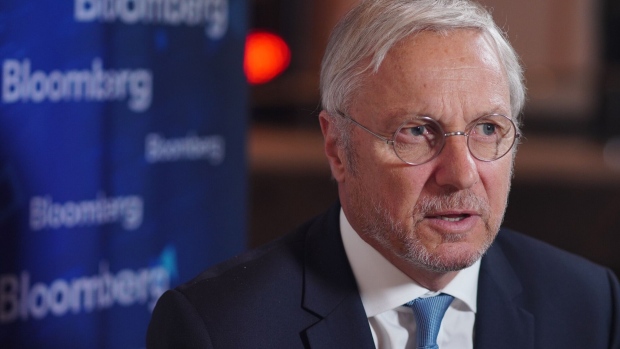Jun 5, 2023
Airline Executives Herald Revival They Predict Is Here to Stay
, Bloomberg News

(Bloomberg) -- As aviation executives descended on Istanbul this week for the industry’s annual general meeting, the mood among the crowd was openly buoyant, with participants brushing aside concerns that high inflation or anemic economic growth risk crimping demand.
Willie Walsh, director general of the International Air Transport Association, set the tone when he doubled his forecast for profitability in 2023, predicting net income of $9.8 billion across the 300 airlines the lobby group represents. Carriers have enjoyed bumper summer bookings, lifted by a leisure travel rebound that started with short-haul flights and is increasingly taking hold on more lucrative long-haul routes.
The optimism is fueled in no small part by the near-annihilation experience that many airlines endured during the depths of the pandemic. And Walsh took care to remind attendees during his opening speech there’s a long way to go, given that profit margins remain pitiful for an industry that produces more than $800 billion in annual revenue.
But after the painful encounters of fleet groundings, government bailouts and an uneven reopening that left out major markets like China, executives seem ready to embrace the rebound, even if uncertainties remain.
“Our industry is very much on the conservative side of recovering from Covid,” Lufthansa Chief Executive Officer Carsten Spohr said. “That’s why I’m not nervous.”
One unknown is the sustainability of corporate travel, which executives agreed is still below what they’d like to see. Virgin Atlantic Airways Ltd. CEO Shai Weiss, speaking during the first day of the event, said the corporate customer “has not returned,” echoing similar observations from peers relying on leisure travelers populating the lucrative front of the cabin.
Read more: IATA Latest: Profit May Reach $10 Billion, India’s the New China
Still, with people holding onto jobs and oil prices easing, the risk of another major downturn is receding, most agreed.
Airlines in Europe and the US are scheduled to operate almost the same number of flights this year as they did in 2019, though with slightly higher seat capacity, according to preliminary data from aviation data provider Cirium.
“I think demand is sustainable and is going to continue,” United Airlines Holdings Inc. CEO Scott Kirby said. “We see just a structurally higher level, particularly of leisure demand.”
Air France-KLM CEO Ben Smith also said he remains bullish for the coming months as customers prioritise air travel over other forms of spending.
“This year is just as strong as last year and our summer is even stronger,” Smith said in Istanbul. “Our dependence on business customers is not as high as some of our competitors.”
The rebound is also affecting the way airlines are replenishing their fleets. Airbus SE Chief Commercial Officer Christian Scherer said that “the widebody market is very, very promising,” pointing to greater travel activity on long-haul routes that are typically more profitable for airlines.
Scherer met with customers and prospective buyers of aircraft in Istanbul, trying to hammer home orders ahead of the Paris Air Show later this month, typically a venue where airlines announce deals. Carriers have been quick to fill their order books, not least because Airbus and Boeing Co. are sold out for years on their most popular models.
The upbeat mood was palpable at the IATA gathering, which organisers said was the best-attended yet. As participants crowded into the main conference room to hear Walsh and others speak, executives mingled in the corridors over Turkish coffee and local delicacies. Boeing put on an evening reception on the first night that included jazz crooners and buffet stations, while Airbus will auction off a set of large-scale photographs celebrating iconic moments in aviation history at its party on Monday.
More than 1,520 participants are taking part in the event, the first being held since all Covid restrictions were lifted. Next year’s IATA gathering will be held in Dubai, with Emirates as the host.
Luis Gallego, Walsh’s successor at the helm of pan-European aviation group IAG SA, said the sustainability of demand is “a question that we have every morning in the office.”
So far, it remains “super strong” for the second and third quarter, and even the last quarter of the year is “in line” with the company’s forecast, “so we don’t see any weakness,” he said.
Walsh sought to downplay the perception that ticket prices have moved up alongside greater demand. Compared with pre-pandemic levels, fares for the first quarter were “flat” versus 2019, with supply and demand broadly in balance, Walsh said at a press conference.
“What we’re seeing is that premium travel has recovered slightly faster,” Walsh said.
Some airline executives preferred to strike a more cautious note, reminded of past boom-to-bust cycles that the industry has routinely experienced, and an economic outlook that remains uncertain at best.
“We’re feeling pretty good but I say that with hesitation,” said Virgin’s Weiss. “The macro factors, the fuel, the interest rates, the inflation, have a big impact on our people, customers and corporations.”
--With assistance from Albertina Torsoli, Angela Feliciano and Anthony Palazzo.
©2023 Bloomberg L.P.


